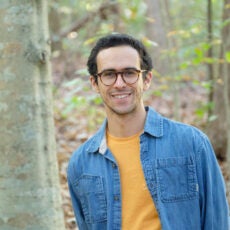
Country Energy
A look at the value that local foods can provide to a sustainable community and also an energy-constrained economy.
Honorable Mention: 2022 Student Blog Competition
The constraints of area and distance in urban Philadelphia aren’t all that different from the rural North Carolina farm I just moved from. Problems are spatial, a question of how much labor, energy, and resources are available, either to furnish a city apartment, or build a sheep fence on new pasture.
Such considerations of material and movement are familiar to my boss, Carla Norwood, who invited me to live on her family farm and work for the community development non-profit and food hub she directs, called Working Landscapes. She was raised by her grandparents in Warren County, the birthplace of the environmental justice movement, in the deteriorating farmhouse that she is now refurbishing. On the farm we dug post holes and hassled the internet company. At work we peeled butternut squash for the dicing machine, and designed grant programs for cover crops.
After going away for an education, Carla is back in her hometown, now a community leader, activist, and mother. She is a close observer of people and the way they form beliefs, make meaning, and meet their needs. She finds deep metaphorical resonances in chainsaw chains, tomato trellises, and forgotten signs. I first encountered a critical understanding of energy through Carla’s musings on our drives together to work. She castigated Duke Energy and considered EROEI values. She traced the tremendous energy it took, both human and electric, to sustain her mother in her final years.
To her, global energy precarity includes a stream of electrons zipping down a country road to an oxygen machine in a thirty-year-old trailer. Meanwhile, we crossed the hydroelectric dam that drowned half of her family’s farm, and we peered over the hedgerows that shield the neighboring solar farm from view.
Carla spends much of her time thinking about food value chains—the ways that farm tools, farmers, truck drivers, cold storage facilities, sunlight, cafeteria workers, pallet jacks, soil, purchasing orders, and many other components mix together to transport nutrients from nature and into our bodies. She explains that Warren County schools serve cantaloupes from California rather than from the farms down the road, and that fewer than 17% of producers earn more than $25,000 from their farms in North Carolina, according to the latest agricultural census. Carla created Working Landscapes to bring greater purpose, meaning, and connection to her community through the food economy, believing that, given the right systems, land and community can sustain one another.
Scholars of energy are increasingly asking us to reconsider the bounds of energy law and the meaning of “structural energy conservation.” In composing a life as a farmer, mother, nonprofit director, and climate activist, Carla considers a question we should all be asking: what will the arrangement of labor, material, and energy be like in a world without hydrocarbons? And furthermore, how can we proactively design a just and enjoyable post-carbon future?
The call of structural energy conservation invites us to think beyond renewable power and imagine what the use of energy might look like in a healthy life, in a healthy community. Might local foods provide greater value, not only to an energy-constrained economy, but to the life of a community living sustainably? Might we feel a greater connection to place when we know our energy derives from the passive and abundant forces of nature?
Carla has convinced me of our planetary precarity, but she’s also shown me how addressing this challenge has filled her life with purpose and her heart with love. In facing the climate crisis, we do so with a vision to an ecological future—one in which people can live and die in interdependence with one another, and with the earth.
Jonathan White
City and Regional Planning, Wetizman SchoolJon White is a first year Master of City Planning student in the Weitzman School He is from Durham, North Carolina.

